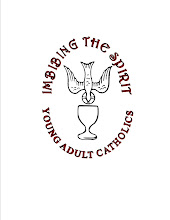Hi all,
I found a few more resources that address
centering prayer and a few other helpful resources when discussing the spiritual life.
The first article,
Letter to the Bishops of the Catholic Church on Some Aspects of Christian Meditation, was mentioned by Robert during our last meeting. This letter was approved by Pope John Paul II in October 15, 1989.
Some interesting points:
#3: "Christian prayer is
always determined by the structure of the Christian faith, in which the very truth of God and creature shines forth. For this reason, it is defined, properly speaking, as a personal, intimate and profound dialogue between man and God."
#10: "the Fathers [bishops, priests, etc from the first centuries of the Christian Church] insisted on the fact that the soul's union with God in prayer is realized in a mysterious way. [...]
Moreover, it can even be
achieved through experiences of affliction or desolation [...] these are not necessarily a sign that the Spirit has abandoned a soul. "
#11: "The meditation of the Christian in prayer seeks to grasp the depths of the divine in the
salvific works of God in Christ, the Incarnate Word, and in the gift of his spirit."
#15: "A consideration of these truths [Jesus is God Incarnate, the Holy Spirit dwells within after baptism, etc] together brings the wonderful discovery that all the aspirations which the prayer of other religions expresses are fulfilled in the reality of Christianity beyond all measure, without the personal self or the nature of a creature being dissolved or disappearing into the sea of the Absolute."
#16: "one can take from them [non-Christian religions] what is useful so long as the Christian conception of prayer, its logic and
requirements are never obscured."
#19: "The great Doctor of the Church [Augustine] recommends concentrating on oneself, but also transcending the self which is not God, but only a creature. God is 'deeper than my inmost being and higher than my greatest height."
#24: "There are certain 'mystical graces,' conferred on the founders of
ecclesial institutes to benefit their foundation, and on other saints, too, which characterize their personal experience of prayer and which cannot, as such, be the object of imitation and aspiration for other members of the faithful, even those who belong to the same institutes and those who seek an ever more perfect way of prayer."
#31: "The love of God, the sole object of Christian contemplation, is a reality which cannot be 'mastered' by any method or technique."
This still doesn't clear up the difference between
meditation and
contemplation. The Catechism of the Catholic dedicates several paragraphs (
CCC #2705-2719) to the meaning of each:
"Meditation is
above all a quest. The mind seeks to understand the why and how of the Christian life, in order to adhere and respond to what the Lord is asking. The required attentiveness is difficult to sustain. We are usually helped by books, and Christians do not want for them: the Sacred Scriptures, particularly the Gospels, holy icons, liturgical texts of the day or season, writings of the spiritual fathers, works of spirituality, the great book of creation, and
that of history--the page on which the 'today' of God is written." (
CCC #2705)
"Contemplative prayer is
silence, the 'symbol of the word to come' or 'silent love.' Words in this kind of prayer are not speeches; they are like kindling that feeds the fire of love. In this silence, unbearable to the 'outer' man, the Father speaks to us his incarnate Word, who suffered died, and rose; in this silence the Spirit of adoption enables us to share in the prayer of Jesus." (
CCC #2717)
St. Thomas Aquinas also discusses contemplation in his
Summa Theologica (
ST, II-II, 179),
specifically his reply to objection 3:
It is true that contemplation enjoys rest from external movements. Nevertheless to contemplate is itself a movement to the intellect, in so far as every operation is described as movement; in which sense the Philosopher [Aristotle] says that sensation and understanding are movements of a kind, in so far as movement is defined 'the act of a perfect thing.' Thomas' discussion on truth is also quite interesting (
ST, I, 16):
But if we speak of truth as it is in things, then all things are true by one primary truth; to which each one is assimilated according to its own entity. And thus, although the essences or forms of things are many, yet the truth of the divine intellect is one, in conformity to which all things are said to be true.Perhaps some of this will develop into further discussion!
Christ's Peace,
Zach




